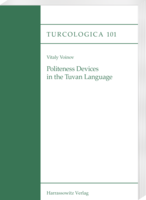|
|
more titles of the subject:
Download:
Please note: With adding digital Products to your cart
the payment will be handled via PayPal. The download will be provided after the payment is confirmed. This work investigates the linguistic expression of politeness in Tuvan, a Turkic language spoken by about a quarter of a million people in South Siberia. Combining insights from Brown and Levinson’s classic model of politeness with those of more recent discursive politeness theories, this work examines the morphological, syntactic, pragmatic, and sociolinguistic aspects of some of the primary verbal means through which Tuvans express politeness to each other in conversation. The language data analyzed is culled from an electronic corpus of Tuvan literature, fieldwork questionnaires, and the author’s individual contact with Tuvan speakers.
The book first explores culturally internal (emic) perceptions that native Tuvan speakers have of what politeness means in Tuvan society: how Tuvans themselves characterize and categorize politeness behavior, what social norms they believe to be primary in generating it, and their evaluation of the current level of politeness versus impoliteness in Tuva. Following this, the work applies a culturally external (etic) grid to examine politeness devices that Tuvans use to manage potential face threats in conversation, separately looking at devices based on social indexing and those based on people’s desire to not be imposed upon. Specific Tuvan verbal devices investigated in detail include respectful pronouns, deferential terms of address, indirect speech acts, polite auxiliary verbs and politeness particles. Although genuine politeness is the primary focus of this book, the discussion also interacts with closely related issues, such as rudeness, overpoliteness, and mock politeness. |
|||||||||||||||||||||||||||||||||||||||||






